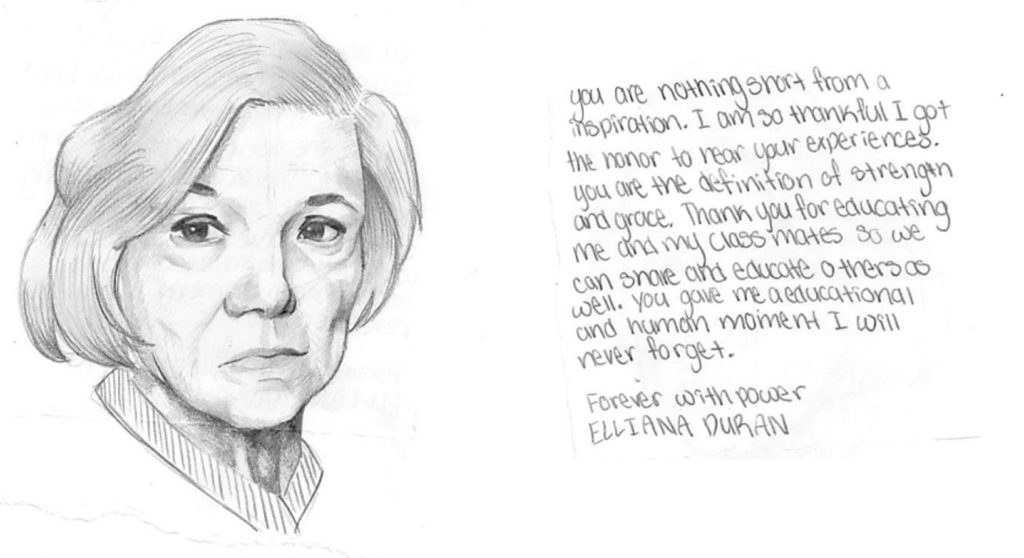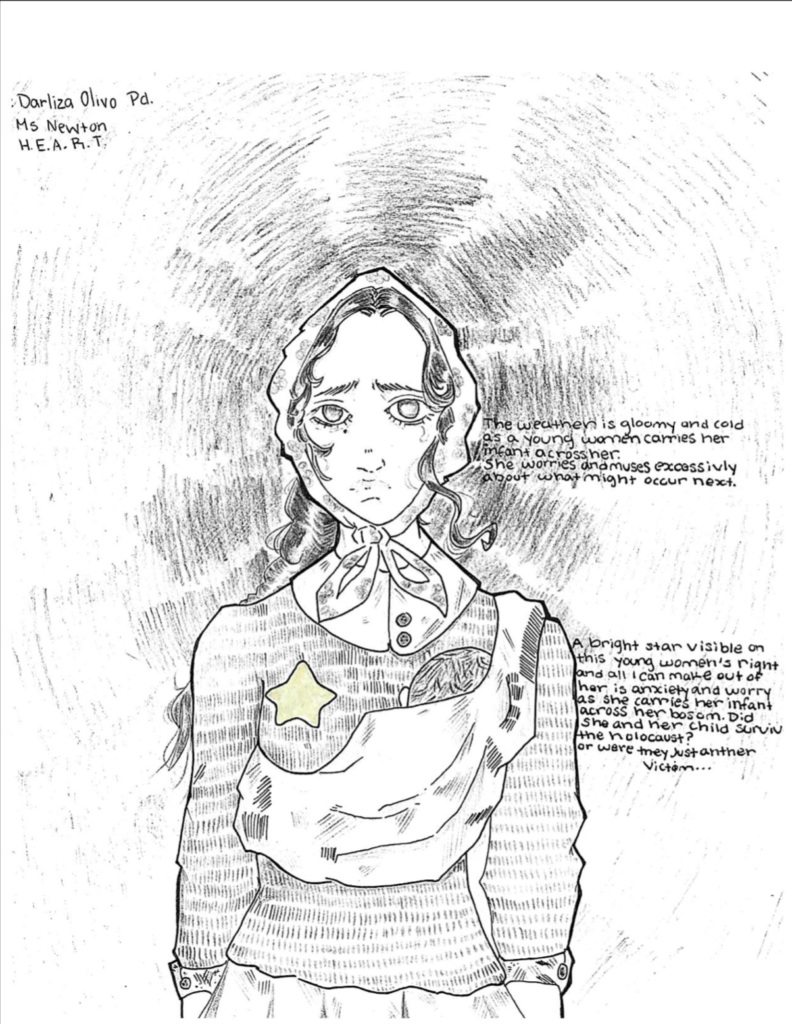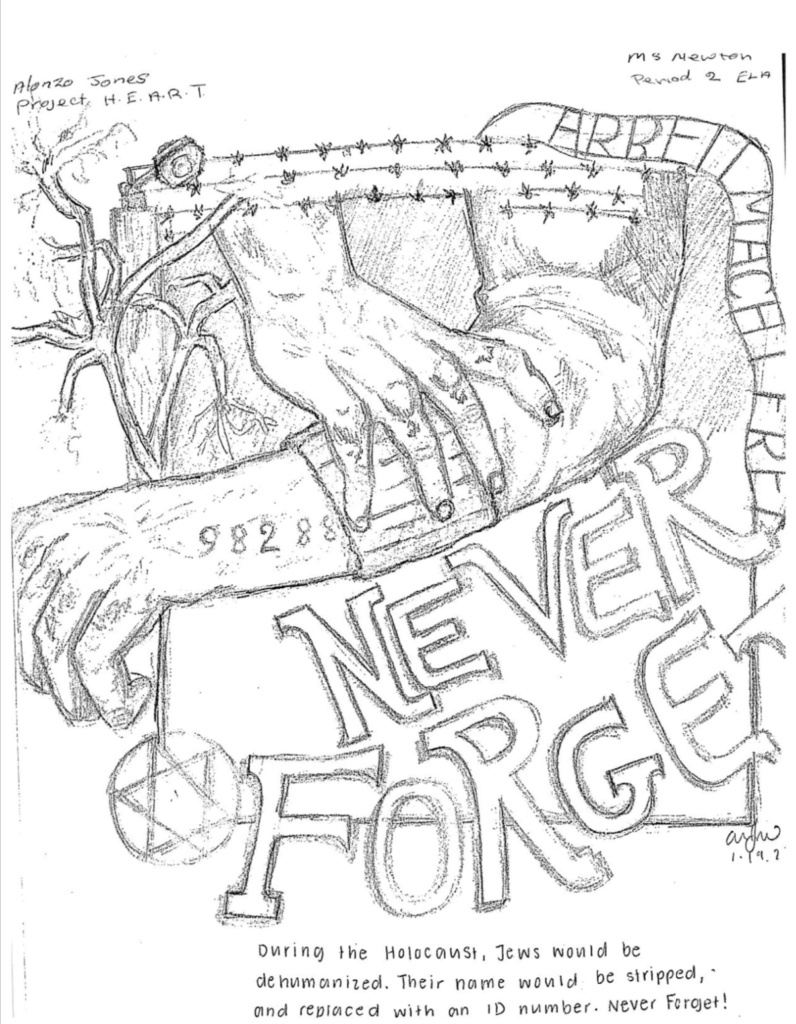On February 6th, Holocaust survivor, Toby Levy, spoke to WHSAD students about her experience as a child during the Holocaust. The event was sponsored by Project Witness, a non-profit organization that offers sources for students to learn about and remember the Holocaust. For the last four years, Project Witness has worked with WHSAD to provide students with information on the Holocaust from people who have lived through the Holocaust first-hand. Toby Levy has made it her responsibility to share her experiences with as many people as possible so the event is not forgotten. As a part of Project Witness, she strives to teach students about the events of the Holocaust and its relevance even today.
Toby Levy was born in 1933, the year Hitler came to power. When Germany’s invasion of Poland began, Toby was just 6 years old and had not even started school. She lived a happy family life with grandparents and cousins who lived nearby. However, antisemitism still existed and her mother would insist she stay in the backyard because Jewish people would get beaten for being Jewish. After the Molotov-Rippentrop Pact was signed by Germany and the Soviet Union in 1939, Toby’s hometown came under control of the Soviets, and citizens were forced to follow Soviet rules. As a result, communism was imposed on them and Toby’s father, who owned a store, had to hide his merchandise so he wouldn’t be caught. After Germany suddenly broke their alliance with the Soviet Union in 1941, many Jewish and Polish people scrambled to leave by train but there wasn’t space for Toby and her family. So her father made the decision to stay where they would be with people they knew. A few days later, adults were assigned to labor details and the Germans set curfews and used armbands to differentiate between the Jewish and Non-Jewish people. In November 1941, Nazis began rounding up Jewish people for deportation to death and concentration camps.
Because Toby’s father worked in a lumber yard, he was able to smuggle materials to build a hiding place his friend had recommended. His idea was to build this hiding place in their basement. While they were hiding, Toby had made a sound and the Nazis stopped to look, but then a cat jumped at them and the Nazis laughed it off and left. Toby’s dad soon realized this hiding place wasn’t good enough to stay at. As a result, he went around to ask who would hide his family. Eventually, a woman named Stephanie Struck agreed to hide the family. They stayed in a barn for two years in constant fear that they would be discovered. Finally, in 1944, the Soviets liberated Chodorow from the German army.
The following are some student responses from a lesson in the Project Witness curriculum, Project H.E.A.R.T. The students in Ms. Newton’s English class wrote about the importance of survivor testimony and what we can gain from such testimony.
Based on these experiences and survivor testimonies, we can learn about how people survived through the Holocaust. We can learn about the kind of people who protected Jews and where and how the Jews who were hiding had to survive. These shared experiences give the viewer/reader a greater understanding of what went on and how this became a very important part in history.
-Melina Gomez
We can learn a lot about Holocaust history and the miraculous ways people survived. This is a very hard topic because those who didn’t experience it cannot begin to imagine the horrors of this time. We learn so much because this period asks the question “WHY?” When we ask ourselves why and try to figure out why, we learn how not to repeat such a massacre. We learn to be more accepting and vigilant in inclusion and more recognizing of discrimination. Not just one person benefits from learning about the Holocaust because society grows together, morally and emotionally.
-Alonzo Jones
From individual experiences, we can learn that everyone went through something different. In Night, Elie Wiesel was sent to a concentration camp while other people like Sarah were sheltered by strangers. From their actions and words, we can learn that they wanted everyone to know the things they’ve seen and the things they had to do to stay alive.
-Luis C.
By listening to different experiences from survivors, we can begin to understand the severity of the Holocaust. Getting inside sources and personal experiences reveals so many aspects that could have been missed. These testimonies bring awareness to the suffering they endured and the mental scarring they are left with. The least we can do is listen to their stories and make some efforts to learn from them.
-Jada Quijano
By hearing different experiences from survivors of the Holocaust, we can learn about hidden information that we might have never heard before. Being given personal experiences can help educate us in more detail. The testimonies help us learn how to prevent tragedies in the future.
-Jonathan Mendez Diaz
In the following statements, WHSAD staff members share their thoughts as to why such events are crucial to our learning community.
“The Holocaust not only teaches kids history but also teaches kids morals and values and to be upstanding individuals. So when you see something wrongful happening, no one should stand by and watch. The Holocaust was an example of when so many people stood by and a way to prevent human rights abuses would be to educate. It’s important we don’t simply judge people based on personal characteristics such as religion and race.”
Ms. Como, Global History
“It was a tragic event in history and just because it happened in the past doesn’t mean we can’t learn from it and hear the experiences of people who suffered through it.”
Mr. Giambrone, Science
“Remembering the Holocaust is important because it allows us to not repeat the same mistakes of the past and make a different choice in the future”
Ms. Moos, Architecture
“The Holocaust is important to remember because we don’t want something like that to happen again to any group of people. We’re seeing a rise of anti-semitism right now and it’s scary to see the parallels and we don’t want that to happen again. Also there are a small number of Holocaust survivors now and no more people who have experienced this firsthand.”
Ms. Weinstein, U.S. History
In 2020 right before the pandemic started, we were introduced to Project Witness by Toby Moskovits, the CEO of one of our long-term partners, Heritage Equity. I met with Ruth Lichtenstein, founder and director of Project Witness, who immediately opened up all of her resources to our English and Social Studies teachers. We were given access to many primary sources that the teachers use in their lessons. We also got access to a curriculum that was designed for students. Over the years, we have worked collaboratively to create tasks. Our teachers get to work with Karen Lerman, an Educator with Project Witness, and we truly feel like we are part of the Project Witness Family.
Each year the students have had the honor to hear from a Holocaust survivor. The first two years, it was Ruth Gruener, and last two years it has been Toby Levy. These events become a dialogue between the students and survivors.
The goal of working with Project Witness has always been, in my opinion, a way of building a two-way bridge between our school and the community at large. It has been wonderful to see our students learn about resiliency from the survivors. It is always so powerful to see how students react when they hear from a survivor that the survivor does not seek revenge. Rather revenge is being able to tell a story of what was done to them and to do good things.
Mr. D’Amato, Assistant Principal of the Humanities



